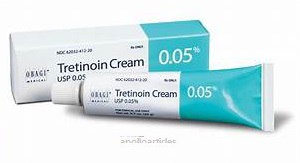Tretinoin Cream Canada
Description
Tretinoin is an innovative formula of vitamin A that gives a new life to your skin. With the help of active ingredients the renewal process of the skin begins. Topical Tretinoin (cream) is used to heal diverse skin problems, including acne and black dots. Additionally, the medication is taken to smooth rough skin and reduce mottled skip discoloration and fine wrinkles. Besides, Tretinoin can often be administered in cases not mentioned in the information leaflet. Learn the safety information about Tretinoin topical carefully to avoid possible collapses and side effects.
Recommendations
 Follow all the instructions and directions given by your healthcare provider when using Tretinoin. The medication is in the cream form, so it cannot be taken orally. Tretinoin should be applied on the skin only. It should not be used on sunburnt, irritated, chapped, dry or wind burned skin, as well as on open wounds. Keep in mind the safety recommendations when using the cream. Do not use it in smaller or larger amounts and never prolong the treatment course without doctor’s advice. Applying Tretinoin topical in increased amounts will not speed up the desirable effect, though it will increase the risk of side effects appearance. Wash your hands carefully before and after using the cream. Apply it on dry clean skin only, as using the medication on wet skin may lead to irritations and allergic reactions.
Follow all the instructions and directions given by your healthcare provider when using Tretinoin. The medication is in the cream form, so it cannot be taken orally. Tretinoin should be applied on the skin only. It should not be used on sunburnt, irritated, chapped, dry or wind burned skin, as well as on open wounds. Keep in mind the safety recommendations when using the cream. Do not use it in smaller or larger amounts and never prolong the treatment course without doctor’s advice. Applying Tretinoin topical in increased amounts will not speed up the desirable effect, though it will increase the risk of side effects appearance. Wash your hands carefully before and after using the cream. Apply it on dry clean skin only, as using the medication on wet skin may lead to irritations and allergic reactions.
Once you have administered Tretinoin topical, wait for an hour before washing the skin. Besides, do not apply other skin care products or treatments on the treated skin at least an hour after using Tretinoin. The cream is a part of the complex treatment course, so follow the full length and usage periodicity recommended by the doctor.
Precautions
See your doctor primarily to Tretinoin topical administration and provide your healthcare specialist with the full information about all the health conditions you have. Do not start the treatment course if you are allergic to the cream. Additionally, it is not recommended to use Tretinoin topical for pregnant and breastfeeding women, as its effect on the unborn and nursing children is not fully studied.
Drug Interactions
Inform your healthcare provider about all the prescription medications, over-the-counter drugs, supplements, herbal products and vitamins you are taking to void possible drug interactions. Despite the fact that Tretinoin cream is not reported to interact with oral medications, there have been multiple cases of such reactions.
Do not apply other skin products that include sulfur, benzyl peroxide, salicylic acid and resorcinol, unless your doctor recommends them. A range of these and other creams may lead to severe skin reactions and irritations if administered together with Tretinoin topical.
Side Effects
Although Tretinoin cream is a safe and effective medication if taken right, the treatment may cause multiple side effects if some directions are violated. Seek emergency medical help if you have noticed the signs of allergic reactions (including hives, burning, swelling of face, lips and tongue, itching and difficulty breathing), irritation of the skin area you treat, severe stinging and burning, swelling, redness, crusting, peeling and blistering of that zone. Stop the administration of Tretinoin and call your doctor for further instructions.
The common side effects that can appear from Tretinoin use include color changes of the treated area, mild stinging and warmth in the place where the medication was applied. These are usual reactions of the skin to new components, and the symptoms will disappear within a few days. Besides, your skin may get extremely sensitive to sudden weather changes when on Tretinoin treatment.

